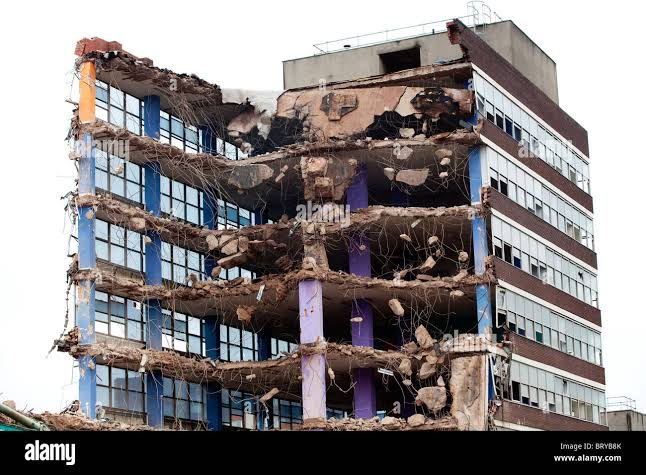MARKET PERSPECTIVE
By J Mulraj
April 14- 20, 2023
What will be its impact on the US economy?
Is the banking crisis over? After 3 US banks and 1 Swiss global bank were rescued, thanks to swift action by monetary authorities, it appeared so. However, a new crisis is brewing in the US commercial real estate market (CRE). CRE is any non-residential real estate, which includes multi-family homes (or condominiums given on rent), shopping malls, offices etc. The total value of CRE is $ 20.7 trillion.
Of these, multi family condos are the safest; the other segments have serious problems ahead, for various reasons. Many office spaces are being released at the end of the lease period, because of the increasing trend of work from home (wfh), after Covid. A J.P. Morgan podcast ‘Frankenstein’s Monster’ says wfh accounts for 30% of office time, compared to 4% pre pandemic. The sharp hikes in interest rates have, simultaneously, impacted corporate profitability, and companies are seeking lower rentals to renew leases.
A lot of retail stores, including large chains, are shutting shop, again, for a variety of reasons. The most insane is the California State Proposition 47, which, in pursuit of its woke policies, has made shoplifting under $ 950 a misdemeanor, which means shoplifters face no pursuit or punishment! Unsurprisingly, shoplifting is up 15% and, in some cases, has doubled. Another reason is increase in crime, aided by another woke policy of defunding the police!
In San Fransisco, Whole Foods closed its store after a year’s operation, citing concern for worker safety. Walmart has shut down half its stores in Chicago and Portland, citing record thefts after break ins. Nike shut its store after 15 overnight break ins in 2 months. All these closures result in job losses, and, of course, rising commercial real estate vacancy. San Francisco has some 29 million sq. ft. of empty office space.
So the signs of a possible collapse in CRE are there, as vacancies have risen and new tenants are not coming forward unless rents fall sharply. If they do, bank lending will cease, as lower rental brings down asset value. Some 70-80% of the lending for CRE is done by the smaller, regional banks. The large banks restricted lending to real estate after the 2008 crisis. Perhaps Wells Fargo is the only large lender in commercial real estate, and defaults by borrowers could trigger a crisis. Other lenders are the shadow banks, such as hedge funds, money market funds, private investment banks like Goldman Sachs, etc. Shadow banks aren’t banks, but provide some banking services, and are lightly regulated.
So a collapse in the CRE sector would affect regional banks, shadow banks, pension funds like CalSTRS, holders of commercial REITs, and others.
Pension fund CalSTRS, managing $ 307 b of California Teacher’s Retirement funds, has had to write off part of its $ 50 b. investment in its real estate fund. Brookfield, one of the largest, Canadian asset manager, with an AUM of over $800 b., recently defaulted on its $161 m. debt in office property in Washington D.C. and rating agencies downgraded its outlook from market perform to underperform.
The Ukraine conflict continues, unabated. There are two grave risks emanating from the conflict. One is grain. The other is oil.
In July ‘22, under a Turkish effort supported by UN, a deal was signed, to allow evacuation of Ukrainian and Russian grain from the Black Sea, in order to avoid a famine. The deal expires in third week of May ‘23. Whilst agreeing to the deal Russia had sought a removal of sanctions against its agricultural bank, so that it gets paid for the wheat it exports. The West/NATO have not complied with their part of the deal. Unless they do, wheat exports out of Ukraine, through the Black Sea, will stop. Ukraine’s efforts to export via land to neighboring countries like Poland, Belarus, Romania, were met by farmer protests. Ukraine was undercutting them. So, if the collective West does not honor its part of the bargain, there can be a famine in Africa, with perhaps up to 2 million dead. A tragedy of immense proportions. Which will, of course, trigger civic unrest and more conflicts.
The other tragedy unfolding is in oil. Russia produces about 5 million b/d oil in Siberia. If, thanks to sanctions, or lack of demand, or any other reason, this production is cut, the pipes freeze in the Siberian cold. The last time this happened, it took 30 years, and Western know how, to restart oil production from Siberian fields. Can the world live with a permanent loss of 5% of daily oil consumption? So, in this madness (also known as geopolitics) of oneupmanship, if 5 million barrels of oil are lost, the price of crude will shoot to maybe $200/b. That will bring in global recession faster than you can say hallelujah.
Last week the BSE Sensex lost 766 points to close at 59655.
A study by Bloomberg puts the probability of a recession at 75% in UK, 70% in NZ, 65% in USA and 60% in Germany. It is heartening to note that the risk is evaluated at 0% for India! Kudos to India! Little wonder that Apple, the world’s most valuable company, is shifting much of its manufacture of IPhones from China (after evaluating the risk of a US China conflict over Taiwan) to India. If the most valuable global company exhibits confidence in India’s manufacturing capabilities, others will follow.
What is disheartening is the suggestion from bureaucrats with an antediluvian mindset, of increasing tax on long term capital gains, in order to ‘reduce wealth disparity’. Firstly, capital gains tax is a double tax, as it arises from investing income after tax has been paid on it.
There are two ways of channelizing individual savings to manufacturers who create value. One is through stock markets, which channelize savings directly into manufacturing and services companies. A correct investment decision results in a capital gain, as the company has successfully created wealth. That success ought to be cheered, not taxed! A wrong investment decision results in a loss, which, under tax laws, can only be set off against a future gain. So the proposal to increase tax on LT capital gains is devoid of logic.
Secondly, most of the investment by foreign investors is routed through Mauritius, and escapes tax because of the double tax avoidance treaty. So, by taxing domestic investors, the Government is, in essence, encouraging a gradual increase in foreign ownership of Indian assets. Do you truly desire that, Mr Modi?
Thirdly, if the Government is genuinely concerned about wealth inequality, why not tackle the exponential growth of wealth of politicians, once elected? This article talks of the increase in value of moveable assets of 5 BJP leaders by 3-8 times, since 2018.
The West has pursued a policy of energy transition from environmentally harmful fossil fuels to environmentally cleaner renewable energy. The direction of the transition is laudable. The implementation of it, is not. The collective West, without having built an adequate alternative energy infrastructure, went into a proxy war with Russia with the objectives of weakening Russia, of weaning Europe out of its dependence on Russian fossil fuel, and of expanding its NATO alliance. What has transpired is
> a weaker Europe, rendered uncompetitive without cheap Russian oil/gas, seeking to move some manufacturing to China,
> Russia finding a ready buyer of oil/gas in China, bringing two of the enemies of the collective west closer,
> Some European leaders, like Macron, seeking to distance themselves from US foreign policy, and other allies, like Saudi, moving closer to Russia in their common economic interest, and to China, agreeing to a petroyuan and downgrading the petrodollar
> Big oil companies making a record combined profit of $ 200b. and price of gas (petrol) going over $5/gallon in USA.
There is a chance of a massive Russian offensive, within two months, as the ground dries up to allow tanks to roll over, perhaps leading to a negotiated settlement with Ukraine, which could involve surrender of territory captured by Russia.
So which of the objectives of the collective West have been achieved?
Given the high probability of recession, as forecast by Bloomberg, and given the risks of a famine, and of sharply rising price of crude oil, one can only ascribe the steadiness of stock markets to the words of the 17th century British poet, Alexander Pope, that hope springs eternal in the human breast.
Coming from a Pope that’s more of an edict than an observation!
Picture source: https://www.alamy.com/stock-photo/crumbling-tower-building-uk.html?sortBy=relevant
Comments may be sent to : jmulraj@asiaconverge.com










































COMMENTS